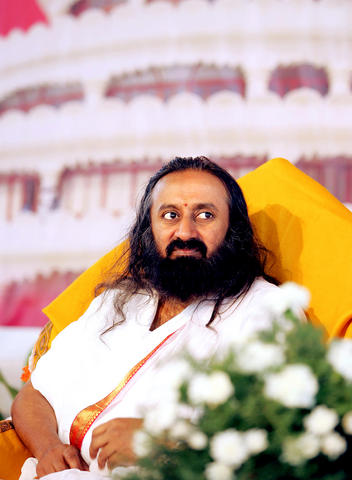Dozens of people are crammed into a small room, lying on the floor and breathing in rhythm to the loud whooshing sounds coming from the mouth of India's leading New Age guru, Sri Sri Ravi Shankar.
The eager crowd is learning a stress-busting technique that the perpetually smiling Shankar - dubbed by one Indian magazine as the "fastest-growing guru in the marketplace of happiness" - says he discovered meditating 26 years ago.
"Stress makes the vision narrow - it doesn't allow you to think clearly or take the big decisions," Shankar, the founder of India's Art of Living movement, said.

PHOTO: AFP
"And, of course, you can't be happy," he adds.
With India's economy booming, Shankar and other New Age gurus have become increasingly sought after as overworked Indians seek new ways to cope with the pressures created by their materialistic lifestyles.
"Many people who come to us suffer from stress overload. They live pressure cooker lives. They need a way to decompress," says Sanjiv Kakar, program director for the movement, which offers courses tailor-made for executives.
The telegenic Shankar hopscotches around the world to help out stressed-out A-listers. He once spoke at the ultra-exclusive World Economic Forum in Davos, where political leaders rub shoulders with the elite of the business world.
He says his program of short, medium and long breaths has been taught in 145 countries to at least 20 million people over the past quarter century.
Shankar - a student of Maharishi Mahesh Yogi, who famously taught "transcendental meditation" to the Beatles in the late 1960s - says his goal is to make the world happier by showing people how to breathe properly.
He calls breathing "the forgotten secret of life" that can bring inner peace.
"For every emotion there's a corresponding breath, so when you're angry you have short fast breaths and when you're happy you take long deep breaths," he explains. "By breathing in certain rhythms we release negative emotions."
Breathe to stay young
The guru, who tacked on the second honorific Sri to his name to distinguish himself from the Indian sitar master Sri Ravi Shankar, also says his breathing program "keeps you young."
"Don't I look young?" Shankar, 51, asks executives at a retreat outside the capital New Delhi with an impish giggle that punctuates most of his sentences.
Indeed Shankar - the prototype of a guru with white robes, shoulder length black locks and black beard - looks in fine form for someone who says he gets by on just three hours of sleep a night.
Critics accuse him of offering nothing but Bobby McFerrin-style "don't worry, be happy" platitudes.
But he has nevertheless developed a big following among India's upper crust - liquor baron Vijay Mallya and former Miss Universe Lara Dutta are fans - with his laid-back message that people do not have to be poor to be spiritual.
While critics also label him "guru to the rich and famous," Shankar defends the right of the wealthy to inner peace.
"The Indian system does not say you have to take a vow of poverty to be spiritual. It is interesting to see that in the West, the basic ingredient of spirituality is to take a vow of poverty," Shankar says.
Renuka Narayanan, religion editor of India's Hindustan Times newspaper, says the Art of Living's "basic product is about peddling yoga," labelling Shankar as "syrupy but genuine."
"What's not to like about yoga?" she says. "It's all about breathing right, replenishing supplies of oxygen, feeling better about life."
Followers say the movement is about more than just tension-releasing lessons - it is also about community service.
"Our spirituality is functional," says Shankar, who this year travelled to war-torn Iraq to impart his breathing technique.
Many people who do the course later work as Art of Living volunteers, the movement says.
Breathe out trauma
"We teach people whose lives have been torn apart by natural disasters and wars to breathe out their trauma," says Kakar, the programme director.
Volunteers like Kakar have taught Shankar's techniques to survivors of the devastating 2004 Asian tsunami. Indian soldiers fighting Islamic militants in Kashmir learn the breathing as part of an army bid to cut stress in the ranks.
Art of Living teams also lead convicts in breathing courses at prisons in India, Canada, the United States and elsewhere. And at India's premier state-run medical facility, the All-India Institute of Medicine, the course is used to help drug addicts in rehab.
"We find addicts who do the course have higher motivation to recover," says psychiatrist Anju Bhawan.
Shankar is a devout Hindu, but he insists the movement is secular.
"The spirituality or common values are the same in every religion - religion is like the banana skin and spirituality is the banana," he chuckles.
The group, headquartered in a massive wedding cake-style building near the southern city of Bangalore, says it is funded by course fees and donations. It costs US$37 to do a course in India and several hundred dollars abroad.
"You can't do charity out of an empty bowl. We do programs, we earn money and we spend it on charity," said Kakar.
Many practitioners say Shankar's program changed their lives.
"It brought me a lot of inner peace," says Ajay Bagga, 38, chief executive of Lotus Asset Management in Mumbai. "I'd been a very aggressive, task-oriented manager, and then I became a much more humane kind of boss."
Shankar shrugs off his worldwide fame, but an adoring personality cult has nevertheless developed around him. Followers call him "His Holiness."
The guru, whose middle class parents were keen for him to be a bank manager, says he knew early on that he wanted to lead a spiritual life. He displayed a precocious ability to master the Hindu scriptures as a child, followers say.
"I would bunk the sports class and come home early. I would go to play football, and looking at my feet, I would say, 'these feet are going to be worshipped, they cannot kick anybody, let alone an inanimate ball'," he says.
Shankar may not have been an athlete in his youth, but he insists he never wants to grow up - and thinks his breathing and meditation techniques will help him do that.
"I am just a child. I am no different from any one of you. Everyone has a childlikeness in them," he says, again with his signature giggle.

“Why does Taiwan identity decline?”a group of researchers lead by University of Nevada political scientist Austin Wang (王宏恩) asked in a recent paper. After all, it is not difficult to explain the rise in Taiwanese identity after the early 1990s. But no model predicted its decline during the 2016-2018 period, they say. After testing various alternative explanations, Wang et al argue that the fall-off in Taiwanese identity during that period is related to voter hedging based on the performance of the Democratic Progressive Party (DPP). Since the DPP is perceived as the guardian of Taiwan identity, when it performs well,

The Taiwan People’s Party (TPP) on May 18 held a rally in Taichung to mark the anniversary of President William Lai’s (賴清德) inauguration on May 20. The title of the rally could be loosely translated to “May 18 recall fraudulent goods” (518退貨ㄌㄨㄚˋ!). Unlike in English, where the terms are the same, “recall” (退貨) in this context refers to product recalls due to damaged, defective or fraudulent merchandise, not the political recalls (罷免) currently dominating the headlines. I attended the rally to determine if the impression was correct that the TPP under party Chairman Huang Kuo-Chang (黃國昌) had little of a

At Computex 2025, Nvidia CEO Jensen Huang (黃仁勳) urged the government to subsidize AI. “All schools in Taiwan must integrate AI into their curricula,” he declared. A few months earlier, he said, “If I were a student today, I’d immediately start using tools like ChatGPT, Gemini Pro and Grok to learn, write and accelerate my thinking.” Huang sees the AI-bullet train leaving the station. And as one of its drivers, he’s worried about youth not getting on board — bad for their careers, and bad for his workforce. As a semiconductor supply-chain powerhouse and AI hub wannabe, Taiwan is seeing

Jade Mountain (玉山) — Taiwan’s highest peak — is the ultimate goal for those attempting a through-hike of the Mountains to Sea National Greenway (山海圳國家綠道), and that’s precisely where we’re headed in this final installment of a quartet of articles covering the Greenway. Picking up the trail at the Tsou tribal villages of Dabang and Tefuye, it’s worth stocking up on provisions before setting off, since — aside from the scant offerings available on the mountain’s Dongpu Lodge (東埔山莊) and Paiyun Lodge’s (排雲山莊) meal service — there’s nowhere to get food from here on out. TEFUYE HISTORIC TRAIL The journey recommences with